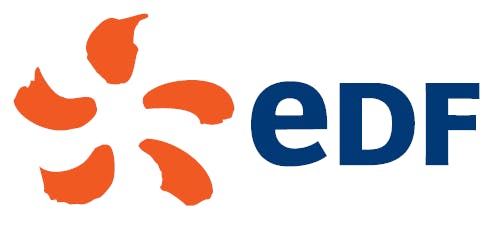3.4 Responsible development
3.4.4 A data responsible company (1)3.4.4 A data responsible company (1)
3.4.4.1 EDF, the first energy company to be awarded the “Responsible Digitalization” label
The EDF group is committed to responsible digital transformation that is low-carbon, low-energy, inclusive, ethical, and adds environmental value for its employees and customers.
3.4.4.1.1 Roadmap
This aim has been asserted at the highest level of the Company in the Group’s SI 2020–2025 roadmap. On the occasion of a seminar on digital transformation on 17 September 2021, the EDF group EXCOM affirmed responsible digitalization as one of its priorities.
This commitment is coordinated by the Digital Transformation Committee, co- chaired by three members of the EDF EXCOM and implemented through a programme dedicated to responsible digitalization.
3.4.4.1.2 Responsible Digitalization Charter
By signing the “Responsible Digitalization Charter”, EDF, Enedis and Luminus (alongside the Belgian Institute) have strengthened their goal, by formally committing to develop sustainable, inclusive and value-creating digital services. Established by France’s Institut numérique responsable (“Responsible Digitalization Institute”), the charter covers every aspect of responsible digitalization.
3.4.4.1.3 Responsible Digitalization Label
20 binding commitments for progress
Drawing on robust achievements, in March 2021 EDF became the first energy supplier to obtain the Responsible Digitalization label developed by France’s Responsible Digitalization Institute with the support of France’s Ministry of Ecological and Solidarity Transition, research agency ADEME, and WWF. Pursuant to the charter, 20 binding commitments for progress have been made, coordinated by a 2021-2024 action plan structured around three areas: development of responsible digitalization by design, improving user experience, and innovation.
In 2022, the actions carried out under this label are progressing according to plan.
3.4.4.1.4 The Group’s commitment
GROUP KEY PERFORMANCE INDICATOR
The key performance indicator is the achievement of the commitments made to the French Responsible Digitalization Institute.
The related action plan comprises 18 actions and 32 related deliverables. It must be completed in full by the end of 2024.
Achievement rate of EDF commitments towards the French Responsible Digitalization Institute (INR) (in %)

Ce graphique nous montre les actions de conseil effectuées auprès des clients dans le cadre du dispositif de l’Accompagnement Énergie (en nb).
2020 : -
2021 : 18.8
2022 : 52,5
Target 2024 : 100
3.4.4.2 Acculturation of employees to responsible digitalization
EDF’s Transformation and Operational Efficiency Department has set up a mini website within the EDF group’s intranet devoted to digital responsibility, featuring educational videos (accessibility, smartphones, printing), “digital responsibility” MOOCs, toolboxes, and interviews with employees, managers, and sponsors involved in the initiative. The responsible digitalization programme at Luminus also includes awareness-raising actions. Two sustainable storage awareness campaigns were organised in spring and summer 2022 as part of the World Cyber Clean Up initiative. Luminus’s intranet was updated to take account of best data archiving practice.
3.4.4.3 Sensible use of digital tools
To highlight and further the commitments made by the business over the last few years in terms of energy sobriety, EDF adopted an internal energy sobriety plan in August 2022 with the aim of reducing the Company’s key consumptions by 10% based on proactive measures and employee engagement. Three main methods are used including optimising digital practices (for further details on this area for improvement, see the introduction to this section of the 2022 URD “Focus on the energy sobriety plan”).
(1) This section may be usefully supplemented by the action taken by R&D in section 1.5.1.4 “Accelerating digital transformation”, and the section “Risks to which the Group is exposed” in section 2.2.4, which deals in particular with cybersecurity issues.
